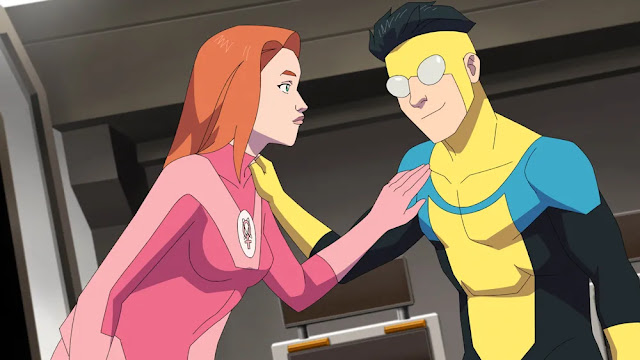PHENOMENALITY: *marvelous*
MYTHICITY: *poor*
FRYEAN MYTHOS: *adventure*
CAMPBELLIAN FUNCTION: *cosmological*
It's tough to find much to say about these 16 mediocre Filmation cartoons, in marked contrast to my review of the 17 stories the same company did in 1968, also starring Batman, Robin, and Batgirl and featuring many of the well-known Bat-villains. I'm sure Filmation re-used various drawings from the 1968 series in this one, but I wouldn't have minded that, had the second cartoon emulated some of the clever writing as well. Further, I mentioned that I liked a lot of the 1968 voicework. But the 1977 show showed its poverty of imagination by having the same fellow, one Lennie Weinrib, execute almost all of the villain-voices. True, Adam West and Burt Ward were hired to re-enact Batman and Robin for the first time since the live-action show ended in 1968. But their participation added little, because the scripts were so incredibly pedestrian. Even the zany third season of the live-action show gave the Dynamic Duo more good lines to utter.
The show is notable, or notorious, for reviving the DC character Bat-Mite, an extra-dimensional imp. He wore a Bat-costume and strove to be a hero like his idol but proved generally incompetent. He'd been gone from the comics for ten years, since Bat-Mite's sort of humor was perceived as childish by long-time fans of Batman comics. But Filmation, who were going after little kid-viewers, never met a goofy mascot the company didn't like. And though the comics-version isn't very good either, his main appeal was creating chaos with his magical abilities. This Bat-Mite can barely do anything but very minor feats, and worse, for five or six episodes he actually uses a terrible catchphrase: "I was only trying to help!" I'm tempted to think that the deliberately bad catchphrase used by child-actress Baby Doll in an episode of BATMAN THE ANIMATED SERIES-- "I didn't mean to!"--might have been inspired by this real mediocrity.
The classic villains are poorly executed, and the new villains are all worthless, with one slight exception. Keeping current with the media fascination with "moon rocks" brought to Earth by 1970s space ventures, an astronaut (the show's only significant Black character) becomes physically and mentally altered by radiation. He begins transforming into the crazed Moonman and seeks to avenge the plundering of the lunar orb by causing the moon to crash into Earth. In the last three episodes of the series, the original Bat-Mite concept -- that of an imp with near-illimitable magic powers-- gets funneled into Zarbor, a native of Bat-Mite's dimension who can perform all sorts of miracles. He enlists the help of four Bat-villains-- Catwoman, Clayface, Joker and Penguin-- for some dastardly plan in the show's only two-part story-- and then he gets his own episode as the series wraps up.
I suppose the sociological significance of the teleseries is that it was produced at the height of the "anti-violence" crusade in children's cartoons. In my review of the 1968 cartoon I noted that Batman and Robin made free with their fists while Batgirl didn't get much fight-action. But all three heroes are "neutered" of their violent aspects in the 1977 show, and the very minimal fighting here is all done with gimmicks. But one might say that Batgirl still gets the short end of the stick, since Bat-Mite constantly crushes on Batgirl in between his assorted screwups.
































